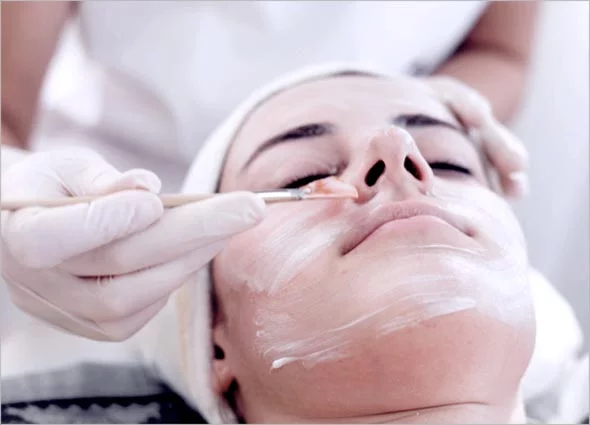Peeling treatment in UAE
SERVICES
- Pink Intimate
- Yellow Peel
- Acne Peel
- Pink Peeling (Lifting)
- Pumpkin Peel
WHAT IS A PEEL?
Chemical peels are cosmetic treatments that involve using acids to exfoliate the skin. The acid removes a uniform amount of damaged skin cells across the treatment area.
All chemical peels remove a controlled amount of skin cells from the epidermis. A stronger peel may also remove a small part of the dermis.
Dermatologists may use chemical peels to reduce the appearance of fine lines and wrinkles or to address: acne, enlarged pores, scarring, redness, hyperpigmentation, Improving skin tone, clarity, color, and texture
The process can cause swelling and peeling, which may take a few days up to two weeks to go away, depending on the depth and intensity of the peel.
TYPES
There are three types of chemical peel, based on how deeply they exfoliate the skin:
- fine wrinkles
- sun-damaged skin
- minor hyperpigmentation
- minor acne scars
- Improving skin tone, clarity, color, and texture
Because superficial peels do not penetrate the deeper layers, skin tends to recover more quickly.
Superficial peels take 1–7 days to heal. It is important to wear sunscreen during this time.
Because superficial peels are the gentlest type, a person may need up to five sessions to see the results they want. People may be able to have superficial peels every 2–5 weeks.
MEDIUM-DEPTH PEELS
Medium-depth peels are recommended for:
- fine to medium wrinkles
- sun-damaged skin
- mild to moderate
- hyperpigmentation
- acne scars
Medium-depth peels take 7–14 days to heal. They cause swelling that worsens for 48 hours after the treatment.
Our dermatologist will provide extensive after care treatment and information.
DEEP PEELS
Deep peels may be recommend if a person has:
- moderate to severe sun damage
- moderate to severe wrinkles
- moderate to severe
- hyperpigmentation
Due to their strength, deep peels take 14–21 days to heal. A person needs to:
- Recuperate at home.
- Take antiviral medication for 10–14 days.
- Wash the skin with a special solution between four and six times a day.
- Apply an ointment for 14 days, then use a thick moisturizer.
- Avoid makeup for at least 14 days.
- Avoid sun exposure for 3–6 months.
TYPES OF ACID
Chemical peels can contain different types of acids:
Alpha-hydroxy acids: Some examples include glycolic acid, lactic acid, and citric acid. At-home exfoliating treatments often contain these acids.
Beta-hydroxy acids: Salicylic acid is one example, and it is especially beneficial for acne-prone skin and enlarged pores.
Trichloroacetic acid: Dermatologists typically use this in medium or deep chemical peels.
If you are looking to improve the look of your complexion non-surgically, then this skin treatment may be right for you
